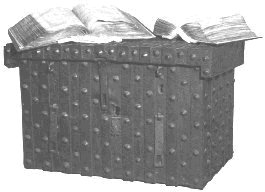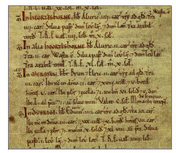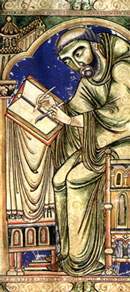|
A web
site for the village of Hartshorne,
Derbyshire, United Kingdom. |
|
|
|
|
| Menu | |
|
|
|
| History | |
| News & What's on | |
| Search | |
|
Quick
search Advanced search |
|
| Guest Book | |
| Business | |
| List/Adverts |
|
| Web site | |
|
Domesday Book
The questionnaire sent out for the Domesday survey asked:
The name of the place The manor of Heorteshorne was in the Wapentake of Walecros later called the Repton Wapentake. A Wapentake is an area of a Country. Derbyshire or Derbyscire was divided into 6 Wapentakes. The 2 entries for Hartshorne were as follows:
Aluric had four carucates for geld. Land for four ploughs. It is waste. Wood, pasturable, half-a-mile in length, and half-a-mile in breadth. Arable land of the same extent. In the time of King Edward it was worth four pounds, now ten shillings. In another Heorteshorne (Hartshorne obviously was comprised of two settlements)... Manerium Heorteshorne Aluric had two carucates of land for geld. Land for two ploughs. It is waste. Wood, pasturable, half-a-mile in length, and half-a-mile in breadth. Arable land of the same extent. In the time of King Edward it was worth forty shillings, now ten shillings.
The manors of Hartshorne were given by William the Conqueror to one of his followers, Henry de Ferrars.
Glossary of terms See the glossary in the history archive for information about the historic terms. If you want to get a rebound copy
of this famous book then visit the Domesday
Book web site. Source: Mr Alan E Sherratt, Hartshorne - An
Historical Collection, p 16-17. |
||
|
The contents of this site are copyright © by Hartshorne Parish Council 2020. All rights reserved. |
 The
Domesday survey began at the 1085 Christmas Court of King William
I of England (known as 'The Conqueror') to provide a record of the
land he had conquered 20 years before in 1066. When the king took
council with his advisors, disputes about landholdings continually
disturbed the collection of taxes. In 1086 Royal commissioners were
sent out to every shire with a long list of questions. The king
died before it was completed. 900 years later (1986 was the 900th
anniversary of the publication of the book) 90% of the towns & villages
still remain.
The
Domesday survey began at the 1085 Christmas Court of King William
I of England (known as 'The Conqueror') to provide a record of the
land he had conquered 20 years before in 1066. When the king took
council with his advisors, disputes about landholdings continually
disturbed the collection of taxes. In 1086 Royal commissioners were
sent out to every shire with a long list of questions. The king
died before it was completed. 900 years later (1986 was the 900th
anniversary of the publication of the book) 90% of the towns & villages
still remain. The
original book was hand-written by, probably, a single monk. It still
exists and is kept at the UK's Public Record Office in Kew (where
the Gardens are) near London. They are kept secure in a metal chest,
to be acrefully removed every few centuries or so when they need
re-binding.
The
original book was hand-written by, probably, a single monk. It still
exists and is kept at the UK's Public Record Office in Kew (where
the Gardens are) near London. They are kept secure in a metal chest,
to be acrefully removed every few centuries or so when they need
re-binding.
 Manerium
(Manor) Heorteshorne
Manerium
(Manor) Heorteshorne